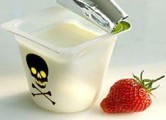 A newly purchased yogurt maker suddenly stopped producing yogurt. Not sour and all. The maximum that is obtained is the usual yogurt. To determine the cause, my homework recklessly put on numerous experiments. They try milk from different manufacturers, “wake up the bacteria” (or who should wake up there), sterilize the dishes, read the instructions aloud to the starter (so that it knows what to do). Success has not yet been achieved, however, milk consumption (for experiments) has doubled.I not only participate in the yogurt hysteria as a guinea pig (I love everything sour-milk, even experimental), but also use it as a source of inspiration.For example, as soon as we doubted the quality of milk for a second, a scandalous and revealing article “Antibiotics in Milk” is generated in my head in no time. Loud accusations, bold statements, an appeal to consumers – a complete gentleman’s set that arose absolutely from scratch.
A newly purchased yogurt maker suddenly stopped producing yogurt. Not sour and all. The maximum that is obtained is the usual yogurt. To determine the cause, my homework recklessly put on numerous experiments. They try milk from different manufacturers, “wake up the bacteria” (or who should wake up there), sterilize the dishes, read the instructions aloud to the starter (so that it knows what to do). Success has not yet been achieved, however, milk consumption (for experiments) has doubled.I not only participate in the yogurt hysteria as a guinea pig (I love everything sour-milk, even experimental), but also use it as a source of inspiration.For example, as soon as we doubted the quality of milk for a second, a scandalous and revealing article “Antibiotics in Milk” is generated in my head in no time. Loud accusations, bold statements, an appeal to consumers – a complete gentleman’s set that arose absolutely from scratch. But I don’t have time to write an article, because as a result of a small Internet research I find out that there are actually a lot of antibiotics in store-bought milk, and there is even a method for testing the amount of antibiotics using yogurt starter. I even found the results milk tests some manufacturers.All this is very interesting, but for some reason I felt like writing about antibiotics. Maybe it is better to devote an article to the problem of the accuracy of measuring the temperature of yogurt in a closed yogurt maker? All the same, I once had something to do with metrology – probably I could have come up with something plausibly scientific? If you wanted…
But I don’t have time to write an article, because as a result of a small Internet research I find out that there are actually a lot of antibiotics in store-bought milk, and there is even a method for testing the amount of antibiotics using yogurt starter. I even found the results milk tests some manufacturers.All this is very interesting, but for some reason I felt like writing about antibiotics. Maybe it is better to devote an article to the problem of the accuracy of measuring the temperature of yogurt in a closed yogurt maker? All the same, I once had something to do with metrology – probably I could have come up with something plausibly scientific? If you wanted…
